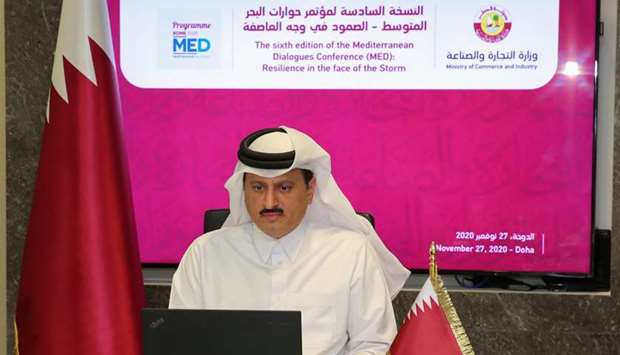Qatar is making proactive efforts to deal with the repercussions of the pandemic by investing in innovation, technology and science to enable urgent and effective measures to contain the virus and mitigate its impact, according to a top government official.
The local private sector has a key role in overcoming the repercussions of the pandemic and seized the opportunity that the crisis offered, especially in the trade and industry sectors, to develop its storage, import and production capacity and to improve the quality of imported and locally manufactured goods, Sultan bin Rashid al-Khater, Undersecretary of the Ministry of Commerce and Industry (MoCI), told a virtual session organised by Italy’s Ministry of Foreign Affairs and International Co-operation and the Italian Institute for International Political Studies (ISPI).
The session was held within the framework of the sixth edition of the Rome MED 2020-Mediterranean Dialogues conference, which is being held in the Italian capital from November 25 to December 4, 2020.
The MoCI, in turn, supported the State's efforts to weather the coronavirus crisis and adopted a flexible and integrated strategy aimed at protecting the private sector and providing companies with the necessary support to adapt to the current circumstances after the gradual lifting of restrictions, he said at a session themed ‘Restructuring Middle East and North African Economies After Covid-19’.
"Qatar has maintained its commitment to the multilateral trading system and strengthened international co-operation frameworks to ensure the continuity of trade as the engine for economic recovery," he said, noting that Doha has stepped up efforts to enhance its advanced logistical networks and to capitalise on its high-quality infrastructure to consolidate its position as a regional and global trade and investment hub.
Qatar’s highly developed infrastructure acts as an important catalyst for companies to invest in value-added sectors particularly the industrial, technological and logistics sectors, according to him.
In this regard, he highlighted Qatar offers investors access to logistic parks and free zones in strategic locations that are in close proximity to Hamad International Airport and Hamad Port as well as a high-speed road network designed in line with the highest international standards.
On the laws and legislations that Qatar enacted to attract and encourage investments, he said Doha took important steps forward in this direction including the issuance of a public private partnership (PPP) law that expands the country’s investment horizons.
The law provides a legislative framework for improving governance and risk management and promoting competition and innovation to bolster Qatar’s dynamic business environment.
"The PPP law will deliver a major boost to Qatar’s business environment as preparations continue to host the 2022 FIFA World Cup with the development of new projects," al-Khater said.
The Rome-Med session focused on recovery efforts through the potential restructuring of regional economies and the adoption of a comprehensive reform agenda that would address basic structural issues and promote a more sustainable and inclusive growth model, in addition to exploring mechanisms to unleash the region’s economic capacity, to support youth and women and ease obstacles that hinder their creative potential.

